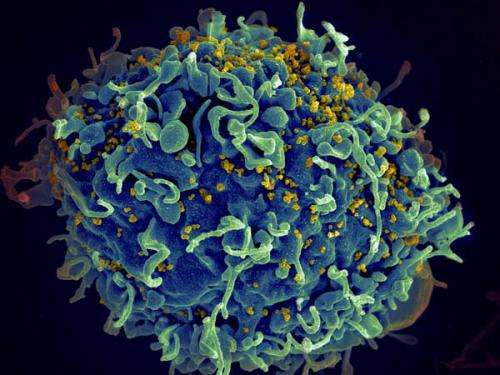In first human study, new antibody therapy shows promise in suppressing HIV infection

In the first results to emerge from HIV patient trials of a new generation of so-called broadly neutralizing antibodies, Rockefeller University researchers have found the experimental therapy can dramatically reduce the amount of virus present in a patient's blood. The work, reported this week in Nature, brings fresh optimism to the field of HIV immunotherapy and suggests new strategies for fighting or even preventing HIV infection.
In a person infected with HIV, there is an ongoing arms race between the virus and the body's immune system. Even as the body produces new antibodies that target the virus, the virus is constantly mutating to escape, managing to stay just a few steps ahead. The new study, conducted in Michel Nussenzweig's Laboratory of Molecular Immunology, finds that administration of a potent antibody, called 3BNC117, can catch HIV off guard and reduce viral loads.
HIV antibodies previously tested in humans had shown disappointing results. 3BNC117 belongs to a new generation of broadly neutralizing antibodies that potently fight a wide range of HIV strains. "What's special about these antibodies is that they have activity against over 80 percent of HIV strains and they are extremely potent," says Marina Caskey, assistant professor of clinical investigation in the Nussenzweig lab and co-first author of the study. 3BN117, which was originally isolated by Johannes Scheid in the Nussenzweig laboratory, targets the CD4 binding site of the HIV envelope, and the CD4 receptor is the primary site of attachment of HIV to host cells, 3BNC117 shows activity against 195 out of 237 HIV strains.
Broadly neutralizing antibodies are produced naturally in some 10 to 30 percent of people with HIV, but only after several years of infection. By that time the virus in their bodies has typically evolved to escape even these powerful antibodies.
However, by isolating and then cloning these antibodies, researchers are able to harness them as therapeutic agents against HIV infections that have had less time to prepare. Earlier work in the Nussenzweig lab had demonstrated that these potent antibodies could prevent or suppress infection in mouse and non-human primate models of HIV. But these animal models are very rough approximations of human infections, explains Caskey. The mice must be genetically engineered to be susceptible to HIV and therefore lack an intact immune system, and the primates used in HIV studies can only be infected with a simian version of the virus. The proof of principle awaited human trials.
In the new study, uninfected and HIV-infected individuals were intravenously given a single dose of the antibody and monitored for 56 days. At the highest dosage level tested in the study, 30 milligrams per kilogram of weight, all eight infected individuals treated showed up to 300-fold decreases in the amount of virus measured in their blood, with most reaching their lowest viral load one week after treatment. The drop in viral load depended on the individual's starting viral load and also the sensitivity of their particular strains of HIV to the antibody.
This is the first time that the new generation of HIV antibodies has been tested in humans. Not only was a single dose of 3BN117 well tolerated and effective in temporarily reducing viral loads, in some individuals it remained active in the body for a long time. In half of the individuals receiving the highest dose, viral loads remained below starting levels even at the end of the 8-week study period and resistance to 3BNC117 did not occur. Researchers also believe that antibodies may be able to enhance the patient's immune responses against HIV, which can in turn lead to better control of the infection. In addition, antibodies like 3BNC117 may be able to kill viruses hidden in infected cells, which serve as viral reservoirs inaccessible to current antiretroviral drugs.
Most likely, 3BNC117, like other anti-retrovirals, will need to be used in combination with other antibodies or antiretroviral drugs to keep infections under control. "One antibody alone, like one drug alone, will not be sufficient to suppress viral load for a long time because resistance will arise," says Caskey. One important benefit is the dosing schedule: an antibody therapy for HIV might require treatment just once every few months, compared to daily regimens of antiretroviral drugs that are now the front-line treatment for HIV.
"In contrast to conventional antiretroviral therapy, antibody-mediated therapy can also engage the patient's immune cells, which can help to better neutralize the virus," says co-first author Florian Klein, also assistant professor of clinical investigation in the Nussenzweig laboratory.
Besides the possibility of treatment, the study also raises hopes for an HIV vaccine. If researchers can induce an uninfected person's immune system to generate potent antibodies such as 3BNC117, it might be enough to block the HIV infection before it can be established.
Ongoing clinical research in Nussenzweig's lab and The Rockefeller University Hospital aims to address the impact of additional broadly neutralizing antibodies, alone or in combination, on viral load in HIV-infected patients.
More information: Marina Caskey et al. Viraemia suppressed in HIV-1-infected humans by broadly neutralizing antibody 3BNC117. Nature, DOI: 10.1038/nature14411





















